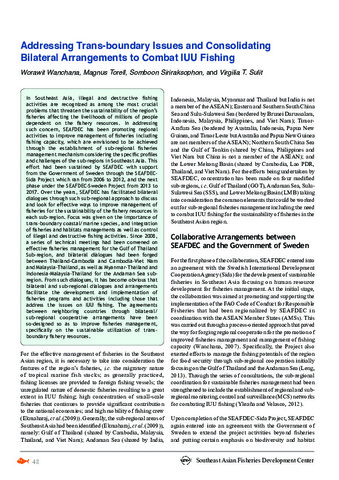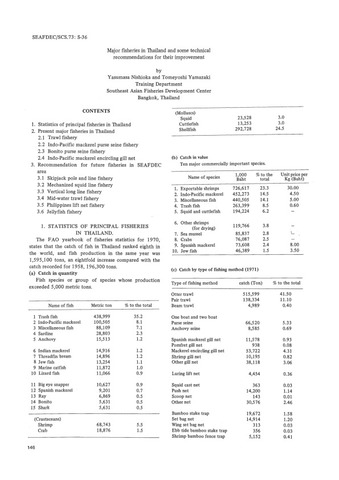အရာများအတွက် ရိုးရှင်းသော မှတ်တမ်းများကို ပြပါ။
Addressing trans-boundary issues and consolidating bilateral arrangements to combat IUU fishing
Share
| dc.contributor.author | Wanchana, Worawit | |
| dc.contributor.author | Torell, Magnus | |
| dc.contributor.author | Siriraksophon, Somboon | |
| dc.contributor.author | Sulit, Virgilia T. | |
| dc.date.accessioned | 2017-11-13T04:52:43Z | |
| dc.date.available | 2017-11-13T04:52:43Z | |
| dc.date.issued | 2016 | |
| dc.identifier.issn | 1685-6546 | |
| dc.identifier.uri | http://hdl.handle.net/20.500.12066/993 | |
| dc.description.abstract | In Southeast Asia, illegal and destructive fishing activities are recognized as among the most crucial problems that threaten the sustainability of the region's fisheries affecting the livelihoods of millions of people dependent on the fishery resources. In addressing such concern, SEAFDEC has been promoting regional activities to improve management of fisheries including fishing capacity, which are envisioned to be achieved through the establishment of sub-regional fisheries management mechanism considering the specific profiles and challenges of the sub-regions in Southeast Asia. This effort had been sustained by SEAFDEC with support from the Government of Sweden through the SEAFDEC-Sida Project which ran from 2006 to 2012, and the next phase under the SEAFDEC-Sweden Project from 2013 to 2017. Over the years, SEAFDEC has facilitated bilateral dialogues through such sub-regional approach to discuss and look for effective ways to improve management of fisheries for the sustainability of the fishery resources in each sub-region. Focus was given on the importance of trans-boundary coastal/marine species, and integration of fisheries and habitats managements as well as control of illegal and destructive fishing activities. Since 2008, a series of technical meetings had been convened on effective fisheries management for the Gulf of Thailand Sub-region, and bilateral dialogues had been forged between Thailand-Cambodia and Cambodia-Viet Nam and Malaysia-Thailand, as well as Myanmar-Thailand and Indonesia-Malaysia-Thailand for the Andaman Sea sub-region. From such dialogues, it has become obvious that bilateral and sub-regional dialogues and arrangements facilitate the development and implementation of fisheries programs and activities including those that address the issues on IUU fishing. The agreements between neighboring countries through bilateral/sub-regional cooperative arrangements have been so-designed so as to improve fisheries management, specifically on the sustainable utilization of transboundary fishery resources. | en |
| dc.language.iso | en | en |
| dc.publisher | Secretariat, Southeast Asian Fisheries Development Center | en |
| dc.subject | South East Asia | en |
| dc.title | Addressing trans-boundary issues and consolidating bilateral arrangements to combat IUU fishing | en |
| dc.type | magazineArticle | en |
| dc.citation.volume | 14 | |
| dc.citation.issue | 2 | |
| dc.citation.spage | 48 | |
| dc.citation.epage | 53 | |
| dc.citation.journalTitle | Fish for the People | en |
| dc.subject.asfa | livelihoods | en |
| dc.subject.asfa | sustainable fishing | en |
| dc.subject.asfa | illegal fishing | en |
| dc.subject.asfa | fishery management | en |
| dc.subject.asfa | international cooperation | en |
| dc.subject.asfa | fishery protection | en |
| dc.subject.asfa | sustainability | en |
| dc.subject.asfa | fishery resources | en |
| dc.subject.asfa | shared stocks | en |




